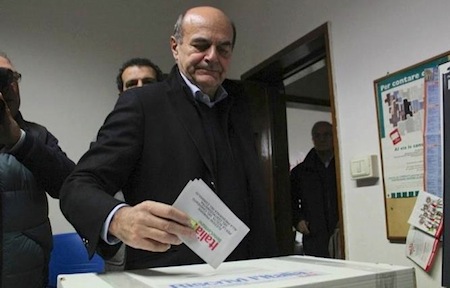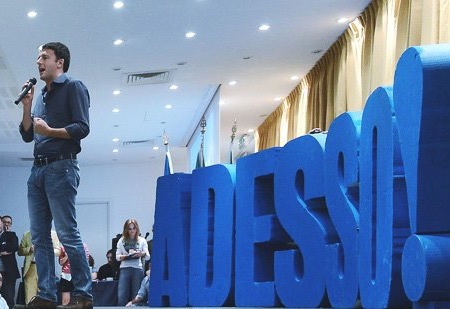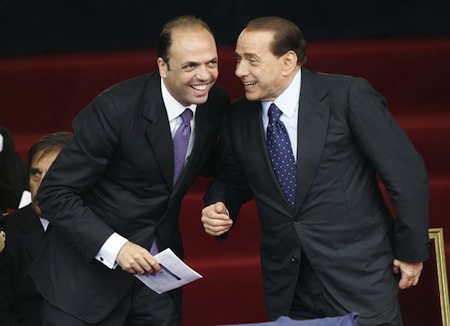After last weekend’s first round of the primaries to choose the Italian center-left (‘centrosinistra‘) candidate for prime minister in advance of expected national elections in April, the current leader of Italy’s largest center-left party, the Partito Democratico (PD, Democratic Party), Pier Luigi Bersani looks like a favorite — even if just slightly — to win the runoff this Sunday.![]()
Bersani (pictured above) won 44.9% of last weekend’s primary vote of around 3 million Italian voters, while the youthful mayor of Florence, Matteo Renzi, placed a close second with 35.5%. The two faced off in a television debate earlier Wednesday, although the two candidate disagree more on tactics and broad themes than individual policies.
The regional president of Puglia — Italy’s southeastern corner — Nichy Vendola, who is openly gay and the most leftist of the three candidates, as well as the founder and leader of the more radical Sinistra Ecologia Libertà (SEL, Left Ecology Freedom), placed third with 15.6% — the SEL and a handful of other small parties have agreed to unite behind the winner of the centrosinistra primary as the prime ministerial candidate of the broad Italian left.
So with the centrosinistra primary set to end with the December 2 runoff between Bersani and Renzi, it appears that Bersani will win, despite the momentum behind Renzi’s candidacy and his promise to bring a new generation of leadership to Italy. Vendola, earlier today, endorsed Bersani after indicating earlier that Bersani’s words were more ‘profumare di sinistra‘ — perfumed with leftism — than Renzi’s.
The battle between Renzi and Bersani is less ideological than generational — at 61, Bersani personifies the boring and staid leadership of the past 20 years of the Italian left. At age 37, however, Renzi is something quite new in Italian politics. His campaign’s theme is essentially that Italy is in need of a new generation of leadership — namely, Renzi’s, on the basis that a Renzi premiership would open a new and more productive era in Italian governance. He’s not only called for an end to the era of former prime minister Silvio Berlusconi, but for a clean sweep of the Italian left as well. Renzi’s even picked a fight with Sergio Marchionne, the CEO of Italian carmaker Fiat.
Both Renzi and Bersani have pledged to continue the era of budget discipline enacted by Italy’s current ‘technocratic’ prime minister Mario Monti, who took office in December 2011.
Both candidates, too, have pledged to pursue more growth-oriented policies, even though it remains unclear exactly what either candidate could actually accomplish in an era of austerity throughout much of Europe.
Bersani, with greater ties to Italy’s largest union, the Confederazione Generale Italiana del Lavoro (CGIL, General Confederation of Labour), comes from a stronger social democratic tradition than Renzi, who has styled himself as a modernizer not unlike former UK prime minister Tony Blair. Bersani, the son of a mechanic, served as regional president of the leftist region of Emilia-Romagna in central Italy in the 1990s and as minister of economic development under former prime minister Romano Prodi from 2006 to 2008, where he tried to liberalize the Italian labor market.
Renzi, however, has refused to consider a potential governing coalition with the Unione di Centro (UdC, Union of the Centre), a small centrist group led by Pier Ferdinando Casini. The UdC essentially represents the remnants of the long-dominant Italian Christian Democrats and, while Casini and the UdC would likely find overlapping interests on economic policy, the UdC, with its ties to the Vatican, remains socially conservative (e.g., it opposes same-sex marriage). Bersani, although he is seen as slightly more leftist than Renzi, has nonetheless remained open to a coalition with Casini’s centrists.
Ultimately, it’s hard for me to believe that Renzi will actually win on December 2. The ‘primary’ itself seems skewed in Bersani’s favor — he’s already the leader of the PD, has the support of much of the ‘old guard’ of the Italian left (such as former prime minister and foreign minister Massimo D’Alema), and accordingly, he has access to the left’s strongest party machinery, not to mention the benefit of his CGIL ties. He now apparently has Vendola’s support from the SEL as well.
Furthermore, in a country that shows perhaps more respect for its elders than anywhere else in Europe, it seems unlikely that Italy will anoint as a potential prime minister someone so incredibly young. The contest is especially meaningful because the PD looks set to win the upcoming elections (although the contest remains exceptionally fluid and unpredictable, even by the sometime operatic standards of Italian politics).
Continue reading Bersani leads as Italian ‘centrosinistra’ primary heads to Sunday runoff





